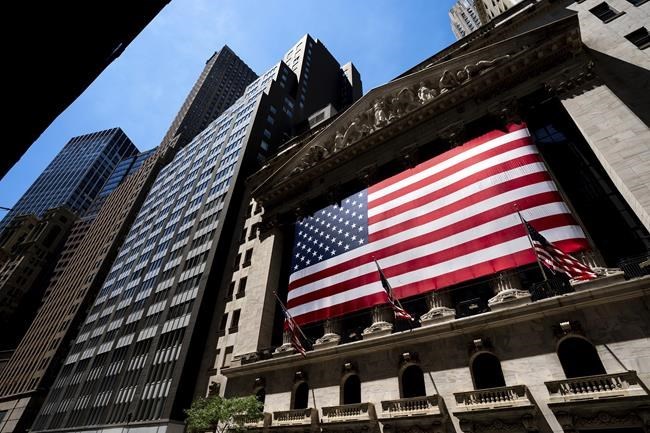NEW YORK (AP) — Stocks sank broadly on Wall Street, worsening their losses for the week, as markets remain anxious about the prospect of more aggressive action by the Federal Reserve to fight inflation with higher interest rates. The losses came after two days of testimony before Congress by Federal Reserve Chair Jerome Powell, who said the central bank was prepared to continue making big interest rate increases if necessary. Investors fear the inflation-fighting policies may tip the economy into a recession and put many people out of work. The S&P 500 fell 1.8% Thursday. The Dow Jones Industrial Average and the Nasdaq also fell.
THIS IS A BREAKING NEWS UPDATE. AP’s earlier story follows below.
NEW YORK (AP) — Stocks fell broadly on Wall Street and added to the week’s losses as markets remain anxious about the prospect of more aggressive action by the Federal Reserve to fight inflation.
The S&P 500 fell 1.7% as of 3:30 p.m. Eastern and is tracking just shy of its worst loss of the year. The losses were widespread; some 94% of the stocks in the index were trading lower.
The Dow Jones Industrial Average fell 508 points, or 1.6% to 32,283 and the Nasdaq fell 2%. All three indexes were higher earlier in the day.
The sharp drop follows two days of testimony before Congress by Fed Chair Jerome Powell, who said the central bank was prepared to continue making big interest rate increases if necessary. Fears about a persistently aggressive Fed have been weighing on major indexes, all of which are on track for weekly losses.
The Fed's inflation-fighting policies risk slowing the economy too much and pushing it into a recession, while also going too far in softening a strong labor market and putting many people out of work.
A government report on Thursday showed that the number of Americans applying for unemployment benefits last week jumped by the most in five months, but layoffs remain historically low.
Yields on the two-year Treasury, which tends to track expectations for future Fed action, eased to 4.87% from about 5.05% just before the unemployment report's release. It had been hovering at its highest level since 2007.
The unemployment data follows a report on Wednesday showing that the number of job openings advertised across the country last month was higher than economists expected. The U.S. government’s more comprehensive report on hiring is scheduled for Friday.
A big concern within the labor market reports for the Fed and Wall Street is the pace of wage growth. Strong wage gains are good for workers struggling to keep up with high inflation, but it could also keep pushing inflation higher, making it harder for the central bank to fight high prices.
“It's leading people to try and come to grips with what a stubbornly tight labor market means for economic growth as well as the inflationary environment,” said Keith Buchanan, portfolio manager at Globalt Investments.
Wall Street has been reviewing a range of data that has highlighted both a resilient economy and stubborn inflation. More updates are coming next week when the government releases reports on inflation at both the consumer and wholesale levels, along with retail sales data.
Traders are leaning toward the Fed raising its benchmark interest rate by 0.50 percentage points on March 22. They had been expecting the central bank to stick with a smaller increase of 0.25 points prior to Powell's testimony this week, according to data from CME Group.
“The notion that was in back of minds of investors was that the worst of the tightening cycle was making its way into the rearview mirror and it would take a lot to reaccelerate tightening,” Buchanan said. “(Powell) put the reacceleration back on the table."
The Fed's goal is to bring inflation down to 2%. That figure stood at 5.4% as of January. The central bank has already raised its key overnight rate to a range of 4.50% to 4.75%, up from virtually zero at the start of last year, its fastest set of hikes in decades.
Companies, meanwhile, have been cautious about their prospects through 2023 with uncertainty about the direction of the economy and inflation. General Motors fell 4.4% after joining a long list of companies with plans to trim its workforce amid worries about a recession. Many companies are coming off of a weak fourth quarter, with earnings for the broader S&P 500 slipping about 4.6%. Economists expect profits to fall through the first half of 2023.
Investors were also focusing on a mix of corporate news that sent several stocks sharply higher and lower. Toymaker Build-A-Bear Workshop jumped 24.2% after reporting strong fourth-quarter financial results.
JPMorgan Chase fell 5.5% after the bank sued its former executive Jes Staley, alleging that he aided in hiding Jeffrey Epstein’s yearslong sex abuse and trafficking in order to keep the financier as a client.
Markets in Europe and Asia were mostly lower.
——
Joe McDonald and Matt Ott contributed to this report.
Damian J. Troise, The Associated Press



